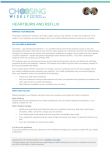PPIs are generally safe and well tolerated. However, to reduce the risk of side effects, it is important that you are on the lowest dose possible, for the shortest time possible. Depending on your condition, your doctor may prescribe a PPI that you only take as required to relieve your symptoms, rather than every day. In some cases, a regular dose taken each day is necessary.
Avoid long-term use – choose wisely
If you don’t need them, PPIs should not be taken long term, because of the possible side effects. There may be a small increased risk of bone fractures, chest infections, kidney problems, gastric cancer and nutrient deficiencies such as low magnesium and vitamin B12. If you’ve been taking a PPI for GORD for longer than 4 to 8 weeks, and your symptoms seem to be well managed, it’s a good idea to talk to your health care provider about reviewing your medicine. They may recommend stepping down your treatment. This could include:
- reducing your daily dose of medicine
- taking your medicine only when you experience the symptoms of heartburn and reflux (also known as on-demand therapy)
- stopping treatment completely as your symptoms may not return. It may be best to reduce the dose over a few weeks before stopping.
Read more about PPIs for heartburn and reflux(external link) Choosing Wisely, NZ
Rebound acid secretion
When PPIs are stopped, a common side effect is rebound acid secretion, where the acid secretion in your stomach increases significantly. This should return to normal within 2 weeks. Because the symptoms of rebound acid secretion are the same as for GORD (such as indigestion, discomfort and pain in your upper stomach and chest, feeling sick and an acid taste in your mouth), it can form an ongoing loop where stopping PPI treatment creates the need to start it again.
Rather than restart PPIs, your doctor may advise you to use medicines that contain both an antacid and an anti-foaming agent, such as Acidex oral liquid or Gaviscon Double Strength tablets. Alternatively, ranitidine tablets can be used. These can be effective for treating rebound acid secretion. You can use these medicines to relieve the symptoms when they occur.
Talk to your doctor or pharmacist about how to manage rebound acid secretion.









